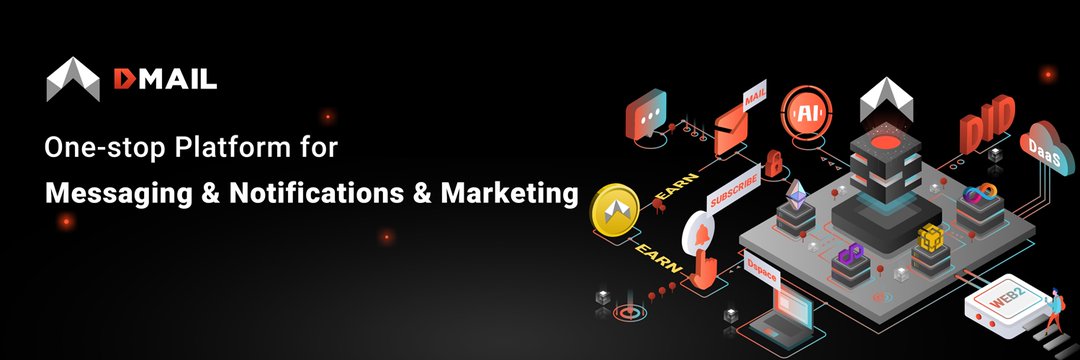Dmail’s Role in Web3 Identity and Privacy
 Tommy williams
Tommy williams
As the world continues to shift toward decentralization, the need for secure, self-sovereign communication becomes more critical than ever. At the heart of this transformation lies Web3 identity, a paradigm where users own and control their data, digital presence, and interactions online. In this space, Dmail Network has emerged as a pioneering force, not just reimagining how we communicate, but also strengthening the very fabric of digital identity and privacy in Web3.
The Problem with Traditional Email
In Web2, email services are dominated by centralized providers like Gmail, Outlook, and Yahoo. While they offer convenience and global connectivity, these platforms come with significant trade-offs:
Lack of Ownership: Email addresses are tied to centralized platforms. If a provider bans or deletes your account, you lose access.
Surveillance & Data Harvesting: Most traditional providers scan emails for keywords to serve ads or track user behavior.
Security Risks: Centralized storage creates a single point of failure. Hacks and leaks expose sensitive user data regularly.
No On-chain Integration: There is no native link between email and blockchain activity, which limits Web3 interoperability.
Web3 seeks to resolve these issues by shifting control back to users—and Dmail is leading the charge when it comes to decentralized communication.
Web3 Identity: The Foundation of Self-Sovereignty
Web3 identity is built around blockchain-based credentials, such as wallet addresses, NFT domains, and verifiable credentials. Unlike Web2, where accounts are created through centralized signups, Web3 allows users to establish identities through wallet authentication (e.g., MetaMask, Phantom).
Dmail taps directly into this framework by letting users register and communicate with their blockchain identity.
Instead of using an email like johndoe@gmail.com, a Dmail user might have a wallet-linked address like johndoe.eth or 0x1a3...bcf.dmail, a true identity that they own and control on-chain.
How Dmail Enhances Web3 Identity
Here’s how Dmail empowers users to strengthen their identity across the decentralized web:
1. Wallet-Based Access
Dmail eliminates the need for traditional username/password logins. Users simply connect their wallet to access their mailbox, making it:
Secure: No centralized database of passwords to be breached.
User-Centric: Users are in full control of their access, tied to their blockchain identity.
2. NFT Domains as Email IDs
Users can link NFT domains like .eth or .sol to their Dmail account. This enables:
Human-Readable Addresses: Easy-to-remember identities replace complex wallet strings.
Cross-Platform Branding: A user’s identity becomes consistent across DeFi, DAOs, NFTs, and now emails.
Verified Ownership: Domains are secured on-chain and verifiable by anyone.
3. On-Chain Communication Records
With Dmail, communication metadata is recorded on-chain, providing transparent yet private proof of interaction without revealing message contents. This allows for:
Verifiable Communication Trails (e.g., for DAO proposals or contract negotiations)
Immutable Records: No risk of deleted or altered data.
Dmail and Privacy: Redefining Trust in Communication
Dmail places privacy at the core of its protocol—something that is often an afterthought in Web2 systems.
1. End-to-End Encryption
All messages are encrypted from sender to recipient, ensuring no third party—including Dmail itself—can access the contents.
2. Decentralized Storage
Dmail stores messages using decentralized solutions (like IPFS or Arweave), not centralized servers. This reduces the risk of mass data breaches and ensures that your messages are tamper-proof and censorship-resistant.
3. No Ads, No Tracking
Unlike Gmail or Outlook, Dmail does not monetize user data. There’s no keyword scanning, location tracking, or intrusive ads.
4. Zero-Knowledge Proofs (ZKPs) (Coming soon)
Dmail has plans to implement ZKPs to further protect user data while still allowing for verification-based use cases. This is ideal for identity verification, KYC-less onboarding, and Web3 reputation building—without compromising privacy.
Dmail in Action: Use Cases Strengthening Identity & Privacy
DAO Governance: Use Dmail addresses to send/receive proposals or voting notifications.
On-chain Support: Brands and DeFi platforms can integrate Dmail to provide secure, wallet-tied customer service.
Private P2P Messaging: Communicate directly with another wallet user—no Discord, no Telegram leaks.
Cross-Chain Notification Layer: With multi-chain support, Dmail helps users manage decentralized notifications in one place.
Final Thoughts
As Web3 matures, having a verifiable, private, and interoperable identity becomes a necessity—not just a luxury. Dmail Network sits at the intersection of communication, identity, and privacy, offering a secure portal to the decentralized internet.
No more compromises on data control. No more sacrificing privacy for convenience.
With Dmail, the future of communication isn’t just private—it’s truly yours.
Start your Journey today : https://mail.dmail.ai
Subscribe to my newsletter
Read articles from Tommy williams directly inside your inbox. Subscribe to the newsletter, and don't miss out.
Written by

Tommy williams
Tommy williams
Web3 Enthusiast Ambassador Web Developer